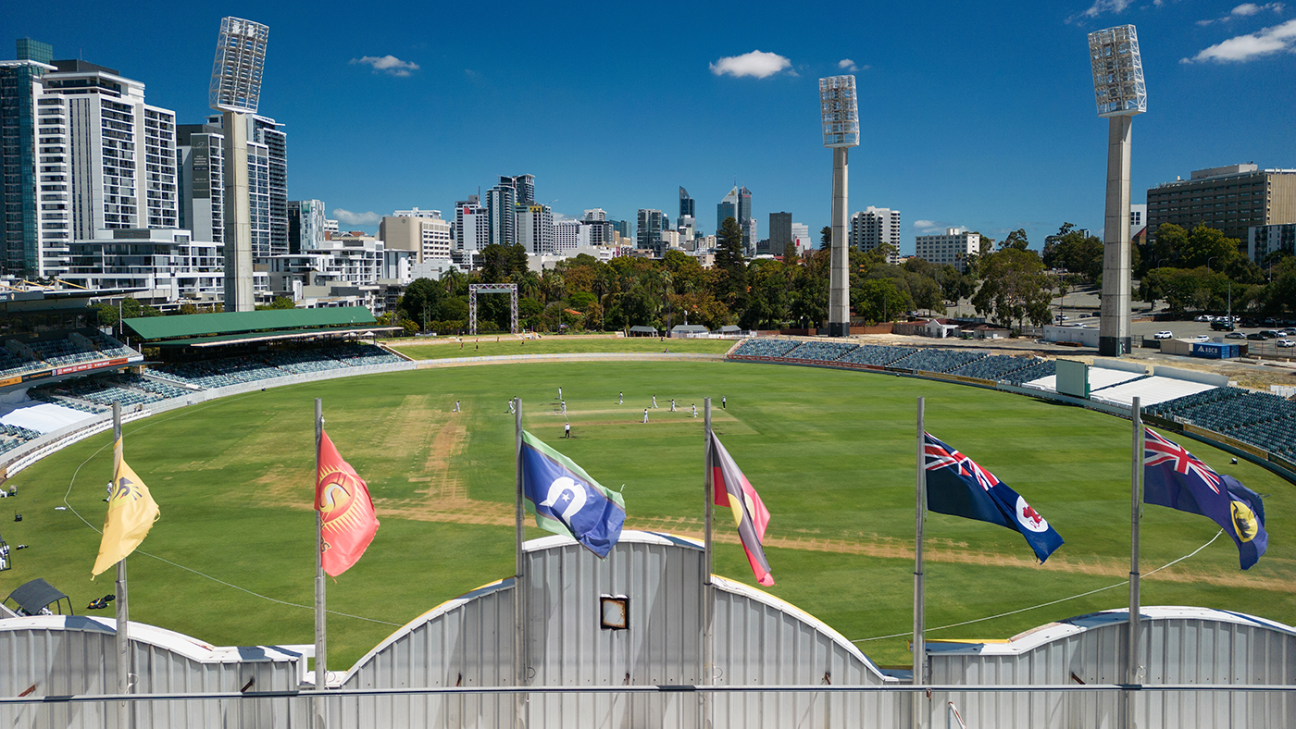
During a Rolling Stones tour of Australia, legendary drummer and noted cricket enthusiast Charlie Watts followed the well-worn trail of many tourists in Perth. He had his photo taken in front of the WACA ground.
"He was on the corner outside of the ground taking a photo because he didn't think he would be allowed in," chuckled WA Cricket chief executive Christina Matthews in an interview with ESPNcricinfo.
The rather amusing anecdote underlines the global reverence of the WACA, the old warhorse entrenched in cricket lore due to its fast and bouncy pitch which has conjured some of the sport's most visceral images.
"The name is our unique selling point of the ground and the thing that makes it world famous," Matthews said. "The name and what's happened out in the middle is something that you can't buy. They're the things we've got to protect."
What they saw was an ageing ground undergoing a major redevelopment with the renowned Prindiville Stand demolished and the grass banks under the iconic scoreboard now resembling a construction site.
The WACA is set to transform into a multi-sport community facility, marked by a public swimming pool, playground and café, while boasting 10,000-15,000 seats for events.
The project was initially pegged at AU$115 million, but has blown out due to increased construction costs since the Covid-19 pandemic and ongoing war in Ukraine.
About $32 million is still needed, Matthews says, with the funds hoping to be derived from the Western Australian government's budget, which will be handed down in May.
If all goes to plan, the redevelopment will be completed by the backend of 2025 - one year after the initial timeframe.
"I'm pretty confident we'll get there. If we don't, we just have to review it," Matthews said. "It would be a genuine community destination that happens to have as its foundation first-class cricket."
Even though parts of the ground are an eyesore, the WACA has continued to host men's and women's domestic cricket while several matches of the 2020 Women's T20 World Cup were played there.
But men's international cricket and the Big Bash League have not been held at the WACA since 2017-18 and there has been uncertainty over whether Test cricket will return to the venue.
Matthews confirmed that higher-profile Tests involving England, India, New Zealand, South Africa and possibly Pakistan would likely be permanently fixtured at Optus Stadium with others set for the redeveloped WACA.
But carving out a perennial date in the calendar has proven difficult for Perth with Tests since 1997 having been played in every month from October-February.
We believe that if we can be given more freedom to run the Test, we could probably get a better result for Cricket Australia. That's not to mean we go rogue, but it becomes embedded in our planning process
Christina Matthews
It's in contrast to the other major cities which have built a tradition around their Tests to create consistency and become a drawcard for fans.
"There are three Tests that have significant stakes in the ground; Sydney has New Year and the Jane McGrath day, Melbourne has Boxing Day and Adelaide is the first-choice day-night match," Matthews said. "Brisbane and us kind of just float...although Brisbane often starts the Test summer.
"We want a bit more security around our Test. Is there something we can do so the people of Perth know they are going to something more than just a cricket match? What does our Test stand for?"
Matthews believed mid-December was the optimal time for a Perth Test match with WA Cricket pushing to host Pakistan next summer during that slot.
"We strongly believe that having the Test match before Christmas is ideal for us," she said. "Given the route [to Perth] from England and other places...and then off to the east coast for Boxing Day and New Year [Tests], it's practical.
"Then people will have an understanding that 'okay, this is when your Test is on...somewhere in December before Boxing Day'."
The underwhelming turnout for Perth's first Test match since 2019 was due to a myriad of reasons, including what appeared a lack of marketing ahead of the summer's opening Test.
"Other than our membership base, we have nothing to do with the Test other than when they [Cricket Australia] ask us for assistance in rolling something out," Matthews said.
"We believe that if we can be given more freedom to run the Test, we could probably get a better result for Cricket Australia. That's not to mean we go rogue, but it becomes embedded in our planning process.
"Every year there's a national marketing campaign, and it's very generic. We think there needs to be something specific for Perth to talk about why people should come to international cricket."
Matthews missed the Test match amid a month's leave after a taxing period, which included a spate of board resignations and unrest emanating from several WA legends.
"There's no doubt that, if you want to call it an old guard, [they] probably want things done differently. The question is - what do they want differently and how do they want it done?" Matthews said. "I can't think of any area that we're not excelling in. We still had a 90% retention rate in members this year. So that tells you people are on board, not against what we're doing.
"There's no doubt that the ruckus of the past six months has come from the older demographic. But it's not the majority view."
Matthews, who played 20 Tests and 47 ODIs from 1984-95, wanted to attract more females to WA Cricket's membership base.
"We have a low percentage of female members because of the model of buying a membership and a guest card," she said. "Historically, men bought memberships and the guest pass was for ladies.
"I think that's a challenge for us as to how we get more women to commit to being a member, not a guest of a member. We want everybody to come to the cricket, not just traditionalists."
Matthews hoped to continue defying her critics in a role she has held for more than a decade.
"It would be negligent of me to move on while we're still trying to embed the development," she said. "We're trying to maintain this ground as a really important part of the WACA's history and have it seen across the world as a modern facility."
Tristan Lavalette is a journalist based in Perth















 Phone: (800) 737. 6040
Phone: (800) 737. 6040 Fax: (800) 825 5558
Fax: (800) 825 5558 Website:
Website:  Email:
Email: 






